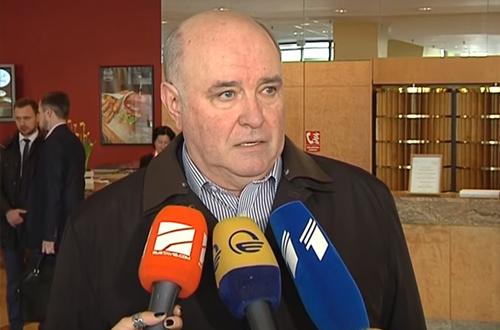
Russia’s Deputy FM Warns Against ‘Anti-Russian Rhetoric’

A video grab image shows Grigory Karasin speaking with Georgian journalists in Prague before meeting Georgian PM’s special envoy on March 16, 2016.
Russia’s Deputy Foreign Minister, Grigory Karasin, said that Moscow is refraining from responding to “anti-Russian rhetoric” of some senior Georgian officials, among them the President and the Defense Minister, but “our patience is not limitless”.
Karasin made the remarks while speaking with Georgian journalists in Prague ahead of his meeting with Georgian PM’s special representative for relations with Russia, Zurab Abashidze, on March 16. The two diplomats hold regular meetings since late 2012 as part of direct “informal dialogue” between the two countries, which have diplomatic ties severed since August, 2008 war.
He said that “provocative anti-Russian rhetoric” of some Georgian government members and the President, which, he said is especially increasing with approaching parliamentary elections in Georgia, poses threat to efforts to build “respectful relations”.
Asked about Russian diplomat’s comments, Georgia’s PM Giorgi Kvirikashvili told journalists in Batumi: “While speaking about sentiments existing in Georgia, the Russian politicians should probably first of all pay attention to their own approaches. Relations based on respect of Georgia’s territorial integrity and sovereignty should become a foundation, which will make complete normalization of our relations possible. We should spare no efforts – of course not at the expense of our foreign policy course and our territorial integrity, compromise is rule out over this issue – to reduce escalation and move to the mode in which it will be possible to talk about solving problems.”
Karasin told journalists in Prague that the “the main goal” of informal bilateral talks between him and the Georgian PM’s special envoy is “to gradually change the philosophy of our bilateral relations between Georgia and Russia towards more constructiveness and normal inter-state ties.”
“In some [areas] we have succeeded… and I think that the philosophy is gradually changing, we have moved away from sharp confrontation in all the areas, which was characteristic to the period of Saakashvili’s [presidency], and we are trying to solve certain practical issues,” the Russian Deputy Foreign Minister said.
“Now the main threat is approaching of the parliamentary elections in Georgia and an obvious increase in provocative, anti-Russian rhetoric heard in Tbilisi, at international forums, heard from public figures and – what is the most regrettable for our bilateral relations – from official representatives, politicians, ministers and even the President [Giorgi Margvelashvili]. Obviously we take note of it; we try not to respond every time when we are needled, but we make conclusions,” he said.
“And now we are at the very watershed moment that we have to pass through – either we return to the period of confrontation and looking for scenarios that may pit us against each other again, or we will gradually establish normal, respectful relations and solve tasks that we face,” Karasin said.
Asked to specify the linkage between Georgia’s upcoming elections and “anti-Russian rhetoric”, Karasin responded: “All the politicians [in Georgia] want to toughen their position and show that they are the most patriotic, the toughest, the most irreconcilable fighters with so called ‘Russian expansion’ and ‘Russian threat’.”
“[Georgia’s] Defense Minister [Tina Khidasheli] has even said that the civilized world should get united against Russian threat. Usually in decent societies such statements are not forgiven,” he said.
“We are refraining [from responding], but I am afraid that our patience is not limitless,” Karasin said.
“We expect normal, respectful relations, similar to those we have had over the past two years, which, in my opinion, brought good results in terms of visa liberalization as well as development of trade relations, transport. We should move forward. We won’t be able to solve all the issues immediately, but gradually we can develop our relations in the spirit of constructivism,” he added.
Responding to Karasin’s remarks, Georgian President’s foreign policy adviser, Tengiz Pkhaladze, said that Tbilisi spares no efforts to resolve problems through negotiations.
“But our rational approach does not mean in any way that we will ever reconcile with occupation [of Georgian territories],” he said. “Georgia’s territorial integrity is the very watershed; territorial integrity is a cornerstone for relations with any country. Georgia calls on the Russian Federation to observe this principle.”
Chairman of the Georgian parliament’s committee for defense and security, GD MP Irakli Sesiashvili, criticized Karasin’s comments as “undiplomatic” and “meddling in internal political affairs.”
“I want to tell the occupant country that Georgian people, this country has chosen its path – European and Euro-Atlantic path – and I am sure that a force allied with the occupant will never be able to come [into power] in this country,” he said.
Speaking at a parliamentary session on March 16, lawmaker from UNM opposition party Giorgi Baramidze condemned Karasin’s comments as “blackmail” and said: “The Georgian people will never yield to such blackmail and its decision whom to elect in the parliamentary elections will not depend on such pressure and blackmail.”
Asked if Moscow was going to lift visas for the Georgian citizens, Russia’s Deputy Foreign Minister said that it was not possible right now “because of number of considerations, including because of security reasons.” He, however, also added: “We should move towards it [lifting of visa rules]”. He also noted Russia’s decision in December to ease visa requirements for Georgian citizens.
This post is also available in: ქართული Русский